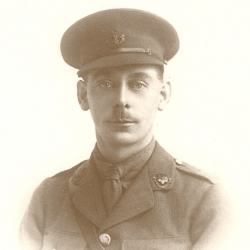William Henry Demel was born in Stretford, Lancashire, on 4 April 1893. His father, Carl Frederick William Demel, was a German national and was living and working in Stretford as a correspondent. 10 years later he was a manager in a shipping office and by 1911 Carl Demel was managing director of a metal merchant and had become a naturalized citizen. By this time, the family which included his wife, Helen Foster Demel, two sons, George Carl Demel and William Henry Demel, and daughter Frieda Eva Demel were living on Sandy lane, Stretford with a domestic servant. William was 17 years old and working as a clerk.
William Henry Demel was commissioned Second Lieutenant in the 9th Battalion Manchester Regiment on 25 February 1915, from the Manchester University Contingent, Senior Division, Officers Training Corps. joined the 2/9th at training in Southport and moved with them to Pease Pottage in June 1915.
On October 8, 1915 he boarded His Majesty’s Transport Ship Demosthenes along with two other Officers and 134 other ranks bound for Gallipoli. They arrived at Mudros on October 20th and joined the Battalion at Cape Helles on October 22, 1915. He served with the Battalion in Gallipoli for the remainder of the campaign and then sailed with them to Egypt where they arrived on January 16, 1916.
On December 14, 1916 he was attached to the Royal Flying Corps, and after a period at the R.F.C. School of Instruction he was transferred to No. 39 Reserve Squadron at Montrose, Scotland, to begin training as a pilot. He was made Flying Officer on May 23, 1917, and whilst still on secondment to the RFC was promoted to Lieutenant in the Manchester Regiment on July 1, 1917. He was subsequently attached to No. 77 (Home Defence) Squadron of the 6th Brigade, based in Edinburgh, specifically to train in night bombing.
After training, he was posted to No. 149 (Night Bomber) Squadron as a Flight Commander on May 22, 1918. The Squadron was sent to France on June 2, 1918 where they remained for the duration of the war, based at various locations. He took part in 50 flights dropping a total of 389 bombs and on September 16, 1918 successfully made a forced landing on bad ground West of Neuve Eglise when his plane was brought down due to enemy fire whilst on a bombing raid. Both he and his observer were able to walk away uninjured.
For his services he was awarded the Distinguished Flying Cross, and was presented with this D.F.C. by H.M. King George V at Buckingham Palace on May 12, 1920.
D.F.C. London Gazette 3 June 1919:
This Officer has done continuously good work as a Flight Commander in a Night Bombing Squadron. He has crossed the lines on 44 night raids, successfully reaching his objectives frequently under very difficult weather conditions.
Demel was posted to the Home Establishment on November 15, 1918, but remained in France until being invalided to England from Wimereux on March 8, 1919 with Influenza. Transferring to the unemployed list on March 20, 1919, he relinquished his Royal Air Force commission on March 4, 1921, and was appointed Captain in the 9th Battalion, Manchester Regiment (Territorial Force) when he relinquished his Territorial commission due to ill-health on 21 June 1924.
He married Phyllis Brundrit Higham on July 19, 1922 and together they had two children. John Glassford Demel was born on July 10, 1923 and Janet Ruth Demel was born on December 23, 1932. The family lived in Birmingham and William worked as a sales manager in the metals industry.
On 25 March 1939, Demel was granted a commission as Flight Lieutenant in No. 915 (County of Warwick) Squadron, a Barrage Balloon Squadron of the Auxiliary Air Force. Since William was to be away for an extended period, his wife and children moved to Anglesey and in August 1939, shortly before the outbreak of world war two, his 16 year old son sailed to Brazil to finish his studies.
William transferred to the Balloon Branch on March 27, 1940, and was promoted to Temporary Squadron Leader on September 1st of that year, transitioning from flying duties to administrative duties. He transferred to the Administrative and Special Duties Branch on July 17, 1941, and then to the Headquarters of the newly-formed No. 44 (Ferry Service) Group on August 15, 1941. He became head of both Administration and Organisation and was granted the non-substantive rank of acting Wing Commander. Demel was granted to the non-substantive rank of temporary Wing Commander on January 1, 1944, before resigning his commission on October 1, 1944, retaining the rank of Wing Commander. Tragedy struck on October 9, 1944 when his son, Flight Officer John Glassford Demel was killed in a flying accident while serving as a flying instructor in the South African Air Force, at 25 Air School in Standerton South Africa. He was just 21 years old.
For his services during the Second World War Wing Commander William Henry Demel was twice recommended for the O.B.E. (which he did not receive) but he was awarded the Air Efficiency Award in 1949.
After the War he returned to working within the metal industry, and between 1958 and 1960 was Chairman of the Midlands Area Council of the Royal Metal Trades Pension and Benevolent Society. Shortly thereafter, he retired and moved with his wife to Anglesey.
Wing Commander William Henry Demel, D.F.C. died in Anglesey on December 24, 1979 his wife predeceasing him. He was 86 years old.

